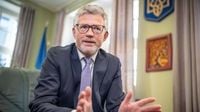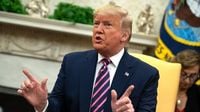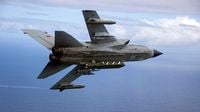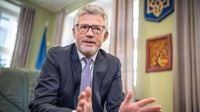The conflict surrounding Germany's potential delivery of Taurus missiles to Ukraine has intensified as political leaders weigh the implications of such a decision. Moscow has issued stern warnings about the consequences of deploying these missiles, while various factions within Germany's political landscape debate the issue.
On April 17, 2025, Russian officials cautioned that the use of German-supplied Taurus missiles against Russian targets would signify Germany's direct involvement in the ongoing war. This warning came from Marija Sacharowa, spokesperson for the Russian Foreign Ministry, who stated that such an action would elevate Germany's role from a supporter to a participant in the conflict.
In Germany, the discourse surrounding the Taurus missile system has become a focal point of political contention. Lars Klingbeil, leader of the Social Democratic Party (SPD), reiterated on April 18, 2025, the need for a unanimous coalition decision regarding any potential delivery of the missiles. He emphasized that the SPD is against unilateral actions and that any decision should be made collectively to avoid escalating tensions.
Friedrich Merz, the designated Chancellor from the Christian Democratic Union (CDU), has openly supported the idea of supplying the Taurus missiles to Ukraine. During discussions, he mentioned that he would only proceed with such deliveries in coordination with European NATO partners, particularly France and the UK, who have already supplied similar missile systems to Ukraine.
Despite these discussions, outgoing Chancellor Olaf Scholz has expressed his reservations about the delivery of the missiles, citing concerns that it could draw Germany further into the conflict. Scholz has previously stated that the Taurus missiles cannot be utilized without programming by German soldiers, a point echoed in a leaked conversation among German military officials earlier this year.
Amidst this backdrop, Andrij Melnyk, the former Ukrainian ambassador to Germany, has called for immediate action. In an open letter to Merz, Melnyk urged him to announce the delivery of 150 Taurus missiles during his expected election as Chancellor on May 6, 2025. He argued that the delivery should not be contingent on negotiations with other nations, stating that these weapons are essential for altering the dynamics of the war.
Melnyk's letter highlighted the urgency of the situation, asserting that the success of Merz's chancellorship could significantly impact not only Germany's future but also the fate of Ukraine and Europe as a whole. He proposed that the new coalition should consider transferring a portion of the Luftwaffe's fighter jets and helicopters to Ukraine to bolster its defense capabilities.
As the discussions progress, the United States has also indicated its stance on the matter. U.S. Secretary of State Marco Rubio announced that the U.S. would wait a few days to see if a ceasefire could be achieved before deciding on its next steps. The U.S. has been actively involved in negotiations with European partners and Ukraine, with talks scheduled to continue in London after Easter.
On the ground in Ukraine, the situation remains dire. Reports from April 18, 2025, indicate that Russian forces have intensified their attacks, with drones and ballistic missiles striking cities such as Dnipro, Sumi, and Charkiw. The attacks have resulted in significant casualties and damage, with 88 individuals reported injured in Charkiw alone. The ongoing conflict raises critical questions about the effectiveness of diplomatic efforts and the potential for a peaceful resolution.
As the political landscape in Germany evolves, the debate over the Taurus missile delivery encapsulates the complexities of international relations in the context of the Ukraine war. The SPD's insistence on a unified coalition decision reflects broader concerns about the ramifications of military involvement, while the CDU's push for support illustrates the urgency felt by Ukraine's allies.
French Foreign Minister Jean-Noel Barrot remarked on the significance of the recent talks in Paris, suggesting that the Trump administration is moving away from a strictly bilateral approach to negotiations with Russia. He emphasized that a just and sustainable peace can only be achieved with the involvement of European partners.
In the meantime, the situation on the battlefield continues to escalate, with Ukraine accusing Russia of violating a 30-day moratorium on attacks on energy infrastructure. Both sides are engaged in a war of attrition, with the potential for further escalation looming as military strategies evolve.
The upcoming decisions regarding the Taurus missiles will not only shape the future of Germany's role in the conflict but also have lasting implications for European security and the balance of power in the region. As leaders grapple with these challenges, the eyes of the world remain fixed on the unfolding events in Ukraine.








